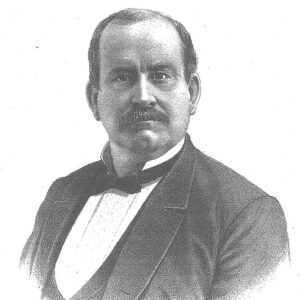calsfoundation@cals.org
Henry Gaston Bunn (1838–1908)
Henry G. Bunn was a prominent lawyer and judge in the late nineteenth and early twentieth centuries. Highly respected in the legal community, he served for eleven years as chief justice of the Arkansas Supreme Court.
Henry Gaston Bunn was born on June 12, 1838, near Rocky Mount in Nash County, North Carolina, to David and Elizabeth Bunn. The family moved to Fayette County, Tennessee, in 1844 and, two years later moved again, settling in Calhoun County, Arkansas. Bunn received his early education in the county schools before returning to North Carolina to Davidson College, which he attended until 1861. Returning to Arkansas, he joined the Confederate army, helping raise a company that became part of the Fourth Arkansas Infantry regiment. Elected to the rank of lieutenant and appointed an adjutant, he served for the duration of the war. Bunn was captured and wounded at the Battle of Pea Ridge in Arkansas and was wounded on multiple occasions in battles in Mississippi, Kentucky, Tennessee, and North Carolina. He left the army having achieved the rank of colonel.
After the war, Bunn studied law; he was admitted to the bar in 1866. Settling in Camden (Ouachita County), he soon developed a successful practice and also got involved in the local community. He served as a state senator from 1873 to 1874, and in 1874 he also served as a delegate to the state constitutional convention, where he was a member of the judiciary committee and the chair of the committee on the Bill of Rights. He served as president of the Arkansas Bar Association for a number of years while also serving as a special judge on both the supreme and circuit benches.
In 1893, Bunn was named a trustee for the University of Arkansas (UA) in Fayetteville (Washington County), a post he held until 1901. In May of that year, Bunn was appointed by Governor William Fishback to fill the vacancy caused by the resignation of Chief Justice Sterling Cockrill. While he had been considered for appointment to the Arkansas Supreme Court in 1884, 1885, and 1889, his support at that time was limited to his local area, but his ever-growing reputation in the legal community made his 1893 selection well-received. In 1896, Bunn was nominated by the Democratic Party Convention for another term, and he easily won election to an eight-year term of his own.
In 1904, Bunn sought another eight-year term, but he was defeated by Joseph M. Hill, becoming the first justice to be denied reelection since the electoral system had gone into effect in 1864. The campaign was a contentious one and ultimately Bunn was the victim of a controversy related to the issue of the court’s docket backlog. Cases had been awaiting action for twelve to fifteen months when Bunn took over as chief justice, but under his stewardship the problem seemed only to worsen. By the 1904 election, cases were languishing for as long as two years. The problem, long recognized within the state’s legal community, had been the focus of discussion and debate at the state’s recent bar association gatherings, with Bunn and his allies arguing that the establishment of an additional seat on Supreme Court as well as the creation of some additional lower courts could help ease the workload. In contrast, Hill and his supporters urged the court to undertake longer sessions, reduce the length of its opinions, and engage in more summary disposal of cases. While a solution to the problem remained elusive, the issue resonated with voters, and Hill defeated Bunn.
Bunn was well respected for his work on the court, and although he was known as a low-key professional, a clash with flamboyant state attorney general and future governor and senator Jeff Davis over whether it was appropriate for an advocate before the court to remove his jacket raised his public profile. His differences with Davis were also highlighted in 1903 when Chief Justice Bunn was the sole dissenter in a case in which the court upheld Davis’s mass veto of 300 bills at the end of the legislative session.
Upon leaving the bench in 1904, Bunn returned to private practice, entering into a partnership with W. E. Patterson and setting up their law practice in El Dorado (Union County). Bunn was married twice. He married Louisa F. Holmes in September 1865; she died ten months later. In 1869, Bunn married Aralee Connolly. The couple had nine children, five of whom survived to adulthood.
Bunn died on July 17, 1908. He is buried in Oakland Cemetery in Camden.
For additional information:
“Arkansas Confederate Regimental History, 4th Arkansas Infantry Regiment.” Pike County Archives and History Society. http://www.pcahs.org/pcaolr/civil01/cvl-0025.htm (accessed January 14, 2022).
“Henry G. Bunn.” Proceedings of the Eleventh Annual Session of the Bar Association of Arkansas, Little Rock, May 21 and 22, 1908. Little Rock: 1908.
Looney, J. W. “Colonel and Chief Justice Henry Gaston Bunn.” Arkansas Lawyer 47 (Summer 2012): 30. Online at https://issuu.com/arkansas_bar_association/docs/summer_2012_forissuu/32 (accessed January 14, 2022).
William H. Pruden III
Ravenscroft School
 Law
Law Post-Reconstruction through the Gilded Age, 1875 through 1900
Post-Reconstruction through the Gilded Age, 1875 through 1900 H. G. Bunn
H. G. Bunn 




Comments
No comments on this entry yet.